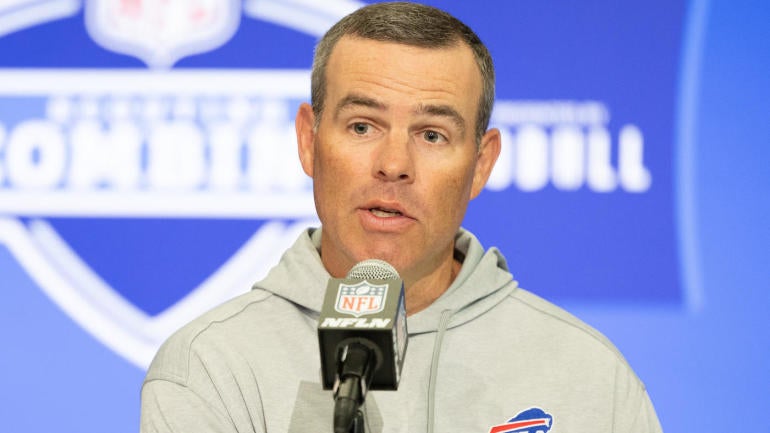
The Buffalo Bills ate more than $31 million to trade star wide receiver Stefon Diggs this offseason, a record for a non-quarterback. So why, exactly, didn't the team wait until after June 1 to deal Diggs, which would've spread the financial impact between seasons? General manager Brandon Beane explained the Bills' reasoning this week, telling "The Athletic Football Show" Buffalo preferred to get "that albatross" of Diggs' contract off the books sooner rather than later.
"I mean, listen, there's a lot of things I think you weigh," Beane said. "A player of his caliber, you weigh a lot of things. But ultimately, we just talked about the (salary) cap. ... I don't need to go through all the reasons why we decided to go ahead and do that. I would say, from a cap standpoint, we decided just to go ahead and eat it out now. We think we can compete and do what we need to do by eating it now. Because if we didn't, if we tried to come up with some way to split it up too many different ways, it's just like that albatross hanging on your neck all year. ... What's '25 look like? What's '26?"
In other words, Beane and the Bills knew the time had come to say goodbye to Diggs, who had repeatedly hinted at displeasure with Buffalo's direction despite productive and well-compensated seasons as Josh Allen's No. 1 target. And rather than push the financial ramifications of Diggs' deal into future years, they opted to take their lumps immediately.
"I'm super-competitive," Beane continued. "I'm gonna be ripping myself the minute we have to walk into a year and I feel like we gotta play with one arm tied behind our back because the cap is what it is. ... We got Josh Allen, and we want to compete every single year for a championship."
By dealing Diggs to the Houston Texans in a swap of draft picks in April, the Bills absorbed a $31.096 million dead-cap hit, losing approximately $4 million in 2024 cap space. But they offloaded the remainder of the four-year, $96 million contract extension Diggs signed in 2022, freeing up a projected $19 million for 2025. They proceeded to restock Allen's receiving corps with a handful of lower-cost veterans, including Curtis Samuel and Marquez Valdes-Scantling, as well as second-round draft pick Keon Coleman.
"Our receiver room right now is like Baskin-Robbins," Beane said. "We got a lot of flavors."
















